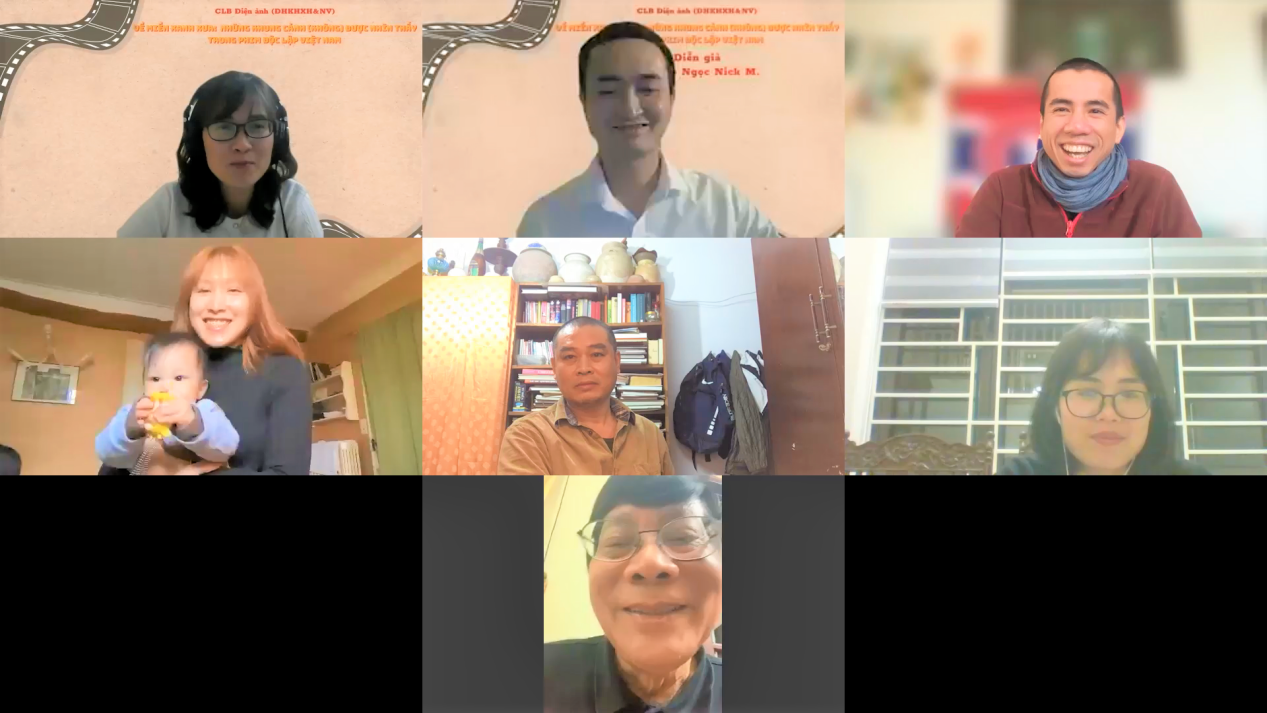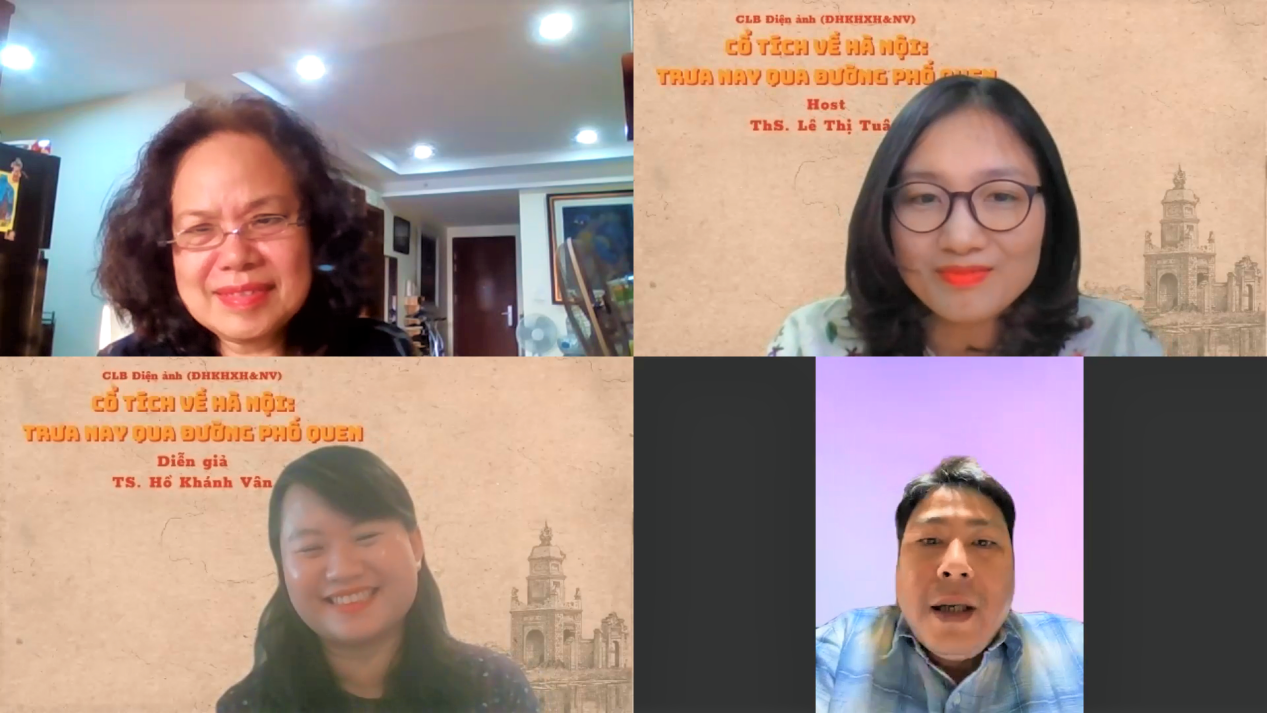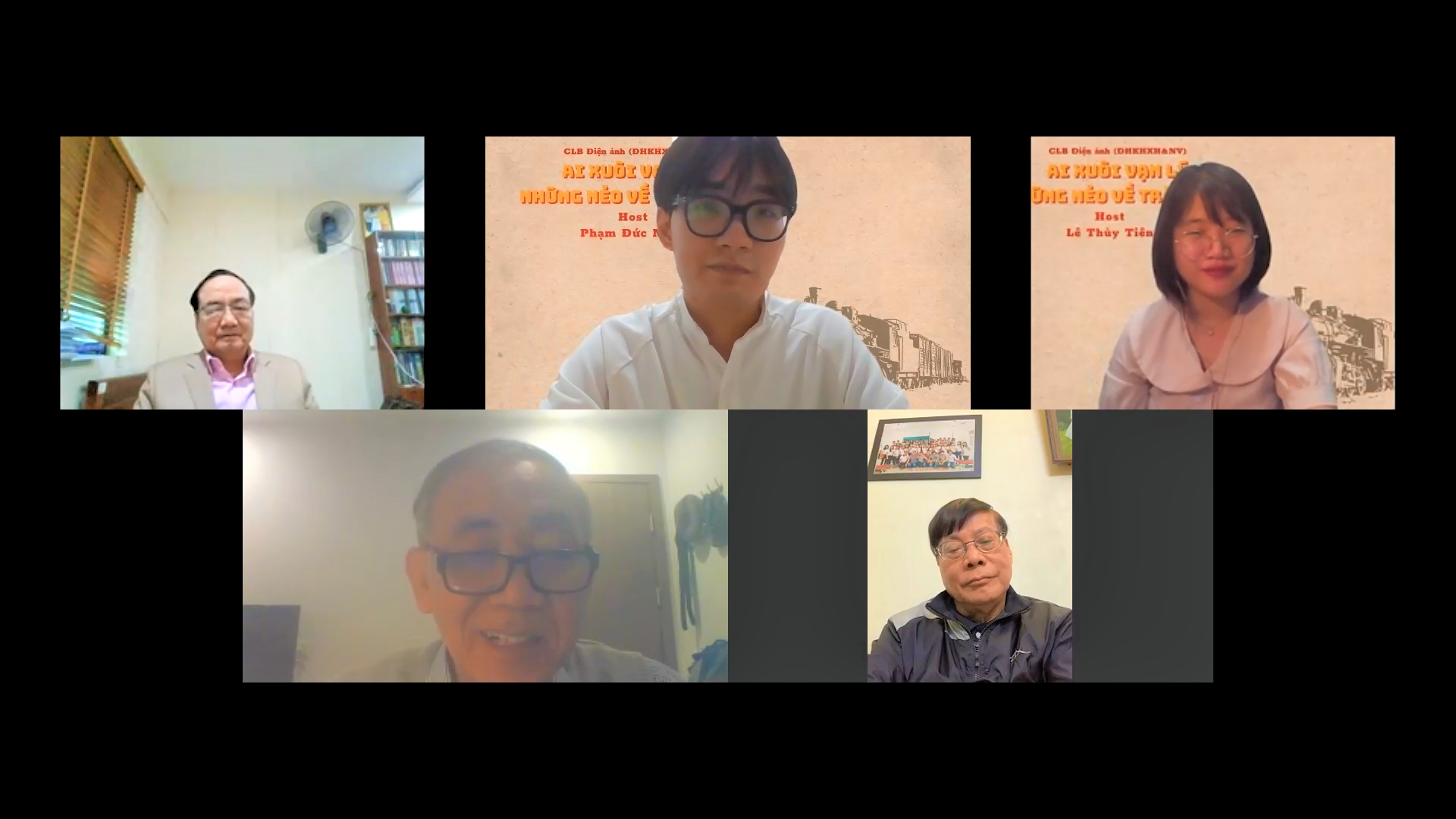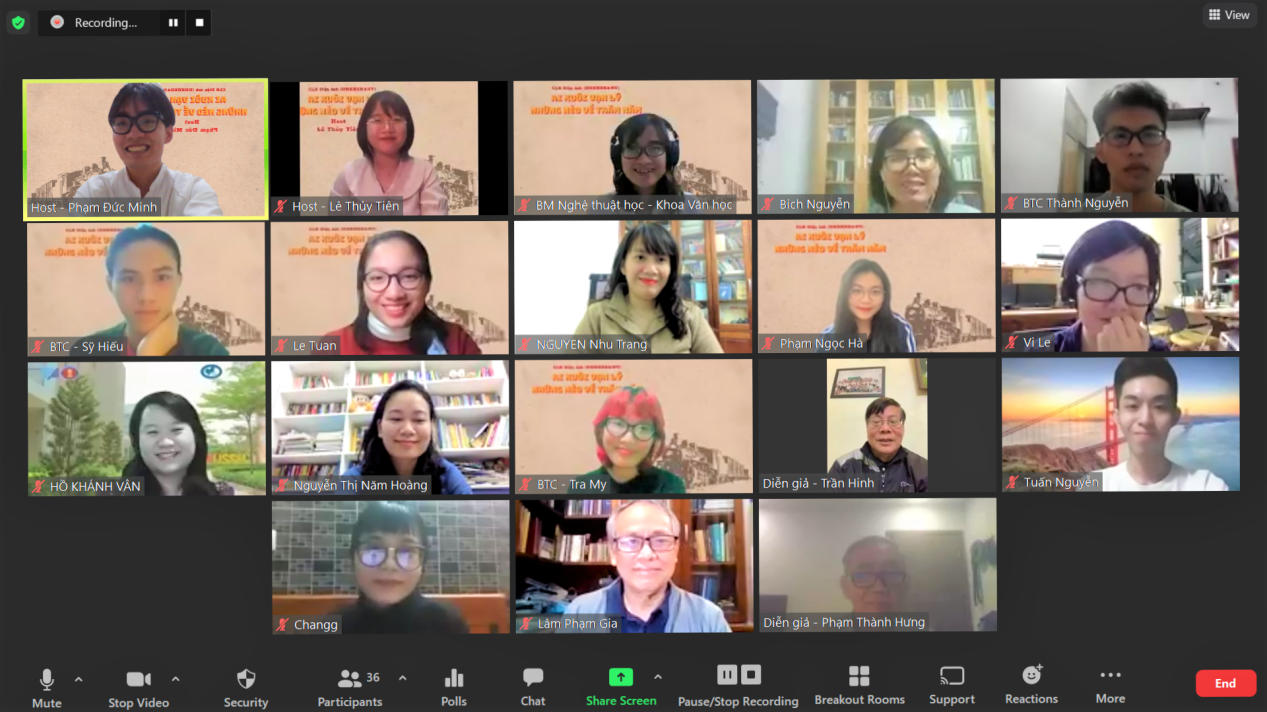When it comes to Vietnamese cinema, audiences often imagine a cinema of “great history”, of great changes, a ‘museum’ of community memories. However, Vietnamese cinema also takes the form of small stories, personal experiences, private memories, with a cinematic language that bears the director’s personal mark. Therefore, according to Dr. Hoang Cam Giang, Head of the Department of Art Studies (Faculty of Literature), and also the curator of the event series: “The purpose of the Department of Art Studies and the Cinema Club is to have a spiritual ‘homecoming’. We are living in the Vietnamese cinema industry, so we hope that young people will have more opportunities to access the artistic environment that they belong to and will live/work in the future.”
On December 11, 2021, at the film screening and discussion "Back to the old green land: scenes (not) seen in Vietnamese independent films", the speakers - journalist, film critic Mai Nhu Ngoc (VnExpress electronic newspaper) and film lecturer Dr. Hoang Cam Giang (University of Social Sciences and Humanities) and the moderator - MSc. Nguyen Thi Bich (University of Social Sciences and Humanities) discussed in depth issues related to the creation and reception of Vietnamese independent films. This is also considered the first discussion to approach cinematic works from landscape theories - a new and promising research direction in social sciences and humanities today. Through four short films:Garden(Doan Hoang Kien, 2010),Mother, daughter and dreams(Duong Dieu Linh, 2018);The invisible river(Pham Ngoc Lan, 2020) andEternal Spring(Viet Vu, 2021), the two speakers pointed out the imprint of 'everyday cinema' aesthetics and documentary nature in these independent, experimental works. For journalist Mai Nhu Ngoc (Ngoc Nick M), these four short films all bear a strong personal imprint, in which "each author brings in his own story. All the characters in the four films are stuck somewhere and want to tell that story." According to Dr. Hoang Cam Giang, it is a type of cinema that "opens up for us a different way of making meaning of reality" - it "questions us about hidden scenes, scenes that have long been denied the opportunity to be present and seen - because commercial filmmakers often focus on 'picturesque', framed, formulaic landscapes".

In particular, the discussion also had the participation of director Doan Hoang Kien, director Viet Vu and director Duong Dieu Linh.
Following the success of the first event, on November 18, 2021, the film screeningFairy tales for 17 year oldsand the discussion "Fairy tales about Hanoi: This afternoon through familiar streets" was held with the participation of screenwriter Trinh Thanh Nha, Dr. Ho Khanh Van (University of Social Sciences and Humanities - Ho Chi Minh City) and the coordination of MSc. Le Thi Tuan (University of Social Sciences and Humanities - Hanoi).
From the perspective of the creator - screenwriter of the filmFairy tales for 17 year olds- Ms. Trinh Thanh Nha shared many interesting stories about the formation process of the script: “At first, my film script was a very honest personal story. Later, through many edits, the “I” of the story in the script gradually transformed into a common “we”. The creative process is the process of turning “I” into “we”, both private and universal”.
Continuing the spirit of the first discussion, Dr. Ho Khanh Van shared about the landscape of Hanoi in the film. According to her, Hanoi is not simply a place name, it is an attachment, an emotion, a sediment that has settled and become a collective memory. “At the same time, Hanoi will always be associated with the growth process of each individual. Therefore, Hanoi is also the space of destiny of each person.” In addition, approaching the film from a feminist perspective, Dr. Ho Khanh Van said: “The film expresses the anti-war spirit and sets out a very Vietnamese feminist perspective. It takes place in every family scene, every dialogue between men and women that we see very clearly in every scene of the film.”
In particular, at the seminar, speakers and guests shared and analyzed the process of creating Hanoi as a space that is both familiar and strange. According to Associate Professor, Dr. Pham Xuan Thach (Head of the Faculty of Literature), although Hanoi always has its own inherent values, this city is also a meeting place for dreams. And therefore, "Hanoi's space seems to be an unconscious space, but in fact it is a continuation of cultural values" - Associate Professor, Dr. Pham Xuan Thach emphasized.

The final film screening and discussion of the series of events - "Who travels thousands of miles - The paths to hundreds of years" took place on the anniversary of the founding of the Vietnam People's Army, so the event aimed to pay tribute to the soldiers, the generations of soldiers who have devoted their lives to the Fatherland. The discussion had the participation of special speakers, which were teachers - soldiers and film experts Assoc. Prof. Dr. Pham Thanh Hung, Assoc. Prof. Dr. Tran Khanh Thanh, Lecturer Tran Hinh (University of Social Sciences and Humanities, Hanoi) and two coordinators Pham Duc Minh and Le Thuy Tien (Executive Board of the Cinema Club). In the discussion, representing the Board of Directors of the Faculty of Literature, Dr. Nguyen Thi Nam Hoang expressed the deep gratitude of generations of teachers and students of the Faculty of Literature to the veteran teachers - those who have devoted all their youth to the country, and now continue to contribute tirelessly to the education of Vietnam.
At the seminar, the speakers discussed the “status” of soldiers, the sadness of war, and the post-war space - the time of healing, therapy, and reconciliation in the film. According to Associate Professor, Dr. Pham Thanh Hung, “post-war reconciliation as the film sets out is an inevitable rule. When the war ends, people return to eternal problems, which are the problems of human fate.”
Continuing the sharing of Associate Professor Dr. Pham Thanh Hung, Associate Professor Dr. Tran Khanh Thanh said that the film raised the issue of the status of soldiers and traders in the post-war period. In particular, the film was built according to the structure of the journey. On the train "going thousands of miles", "the characters return to familiar things and look to the future".

Speakers shared at the panel discussion
Analyzing the film from the perspective of cinematic language, GVC. Tran Hinh commented, “This is a poetic film, especially through the iconic image of the train, the film reflects the process of national unification with full of ups and downs of individuals and society”.
Also a teacher who once wore a soldier's uniform, Associate Professor Dr. Pham Gia Lam shared many stories about his wartime experiences and the post-war reconciliation issues raised by the film. Associate Professor Dr. Pham Gia Lam also sent a message to the students participating in the discussion about the importance of knowledge, because "knowledge will provide us with the energy to live a more human life."

The series of events “Coming home - 'Coming home' with Vietnamese cinema: Small histories, personal memories” has concluded a challenging yet successful year of 2021 for the Cinema Club, Department of Art Studies. “This is not only a useful activity for students and cinema lovers in general, but also an opportunity for the Faculty of Literature to welcome researchers, journalists and artists to come here so that we can share and analyze valuable cinematographic works.” (Dr. Nguyen Thi Nam Hoang).
Overcoming the barriers of the pandemic period, the series of events has become a special space - a "touchless" space - for cinema lovers to interact and share stories about cinema, art, and the era in which we are living and have lived, so that we can feel more deeply the value of every moment we are present in life. According to the event organizers: "Community memories and personal memories will forever be there and contribute to the identity of each of us."
Author:Duc Minh (Cinema Club)
Newer news
Older news